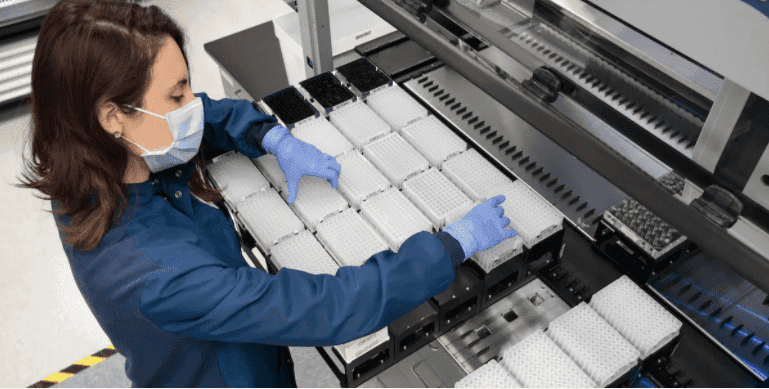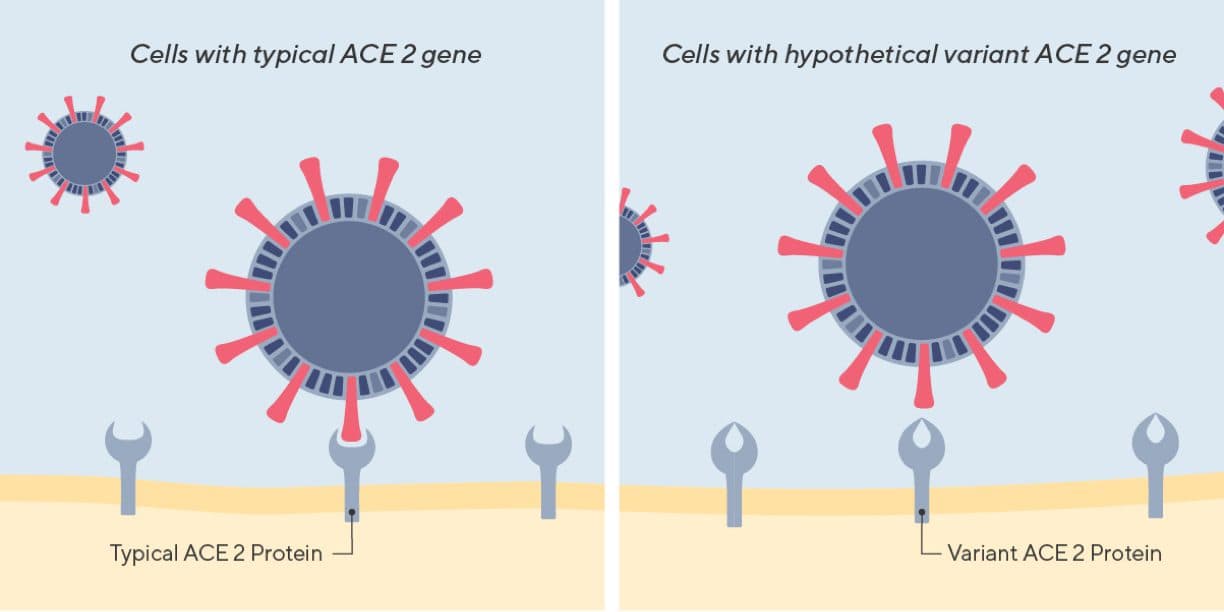Why Helix researchers are studying DNA to learn about COVID-19

Over the next several days, Helix researchers will be reaching out to hundreds of thousands of people—each of them having already had their DNA sequenced by Helix—with a short survey. The survey collects information about a person’s possible exposure to COVID-19, any symptoms (or lack thereof) that they may be experiencing, and any medications they may be taking. This information will then be paired with each respondent’s genetic data and used to identify potential patterns that reveal insights into why some people are more vulnerable to COVID-19 compared to others.
But how can a survey and genetic data help us study COVID-19?
Genetics and COVID-19
In order to infect a person, viruses like the SARS-CoV-2 virus—the one responsible for COVID-19—have to find a way to enter the person’s cells and then trick those cells into producing copies of the virus (which then find more cells to infect and the cycle repeats itself).
Environmental and genetic factors can make this infection cycle easier or harder for the virus. During the HIV epidemic, for example, researchers found that approximately 1% of European ancestry individuals were immune to HIV infection thanks to a variant (a sequence of DNA that is different from what researchers expect to see in most people) they had inherited in their DNA. It’s believed that the same may be true for the SARS-CoV-2 virus—there could be variants in a person’s DNA that affect how vulnerable they are to COVID-19.
If there are variants like this, they’re likely in a gene known as ACE2. SARS-CoV-2 enters cells by interacting with the ACE2 protein which is displayed on the outer surface of certain cells.
The ACE2 protein – a gateway for SARS-CoV-2
To study this, our researchers took a look at the DNA coding for the ACE2 gene. This gene is most well known for its role in regulating blood pressure. But in recent times, it’s drawn a lot of attention from the scientific community because it may also serve as a doorway of sorts, enabling viruses like SARS-CoV-2 to infect cells. Our researchers looked at the ACE2 gene in more than 200,000 people, comparing their exact DNA sequences to see where there are differences among people. Variation in the DNA sequence of a gene is common and is sometimes meaningless. But other times, small changes in the DNA sequence can alter the protein that is made from that gene, in this case the ACE2 gene makes the ACE2 protein which is what the SARS-CoV-2 virus interacts with. We found a lot of variation between individuals and checked to see if that variation coincided with any traits (i.e., people with variant X tend to have high blood pressure more often than people without variant X). All of the traits we looked at were non-COVID-19 related traits, meaning we haven’t asked these people anything about COVID-19 yet (this is because these DNA sequences were collected before the pandemic).

It is possible that changes inherited changes in a person’s ACE2 gene could how the SARS-CoV-2 virus (shown as a blue circle with red extensions) enters cells. We don’t yet know if this situation actually happens, but we hope to find out through our research.
We found that there are a number of variations observed among people in a specific part of the ACE2 gene. These variations are expected to alter the shape or functionality of a specific part of the ACE2 protein: The part that likely interacts with the SARS-CoV-2 virus. We don’t yet know what the real-life significance of this variation is, but it’s possible that these variants decrease the protein’s ability to interact with the SARS-CoV-2 virus, thus decreasing the person’s likelihood of being infected. We can speculate that there will be a spectrum of vulnerability to COVID-19 among people, where some people are more vulnerable than others, and that variants in this part of the ACE2 gene may be the reason. The research we presented shines a light on this part of the ACE2 gene and may give future researchers a direction to go in as they try to figure out what makes people vulnerable to COVID-19 and similar viruses. (You can read the full blog about ACE2 here)
At the moment, the potential impact of these variants is all speculative; it’s currently unknown if changes in the ACE2 gene affect a person’s vulnerability. However, Helix’s researchers are working to study this too.
Helix’s COVID-19 survey
Through a short survey, Helix researchers will be able to investigate this and other potential links between genetics and COVID-19. By asking about a person’s potential exposure to SARS-CoV-2 and any symptoms or medications they may be taking, researchers may begin to see patterns that tell us how a person’s DNA may affect their vulnerability to COVID-19. (For example, they will look to see if people with certain variants in the ACE2 gene report having COVID-19 more or less than people without the variants.) With the responses to this survey, we’ll be asking questions like:
- Why do some people get COVID-19 while others don’t?
- Why do some people have more severe symptoms and others have none?
- Do certain treatments work better in some people than others?
Helix’s researchers hope that these efforts will help other researchers identify potential healthcare strategies for identifying those who are most at risk as well as potential therapeutics for treating—and maybe even preventing—COVID-19 infection. If you have a question about the Helix COVID-19 survey, please email support@helix.com.